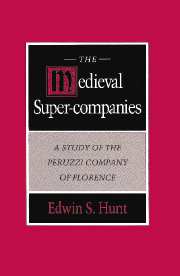Book contents
- Frontmatter
- Contents
- List of tables, figures, and map
- Introduction
- Part I Anatomy of the medieval super-company
- Part II History of the Peruzzi Company from its reorganization in 1300
- Conclusions
- Appendixes
- I Genealogical charts of the Peruzzi family
- II Peruzzi Company balances at July 1, 1335
- III Peruzzi Company and shareholder data
- IV Exchange rate trends
- V Giovanni Villani: his background and reliability
- Bibliography
- Index
V - Giovanni Villani: his background and reliability
Published online by Cambridge University Press: 08 October 2009
- Frontmatter
- Contents
- List of tables, figures, and map
- Introduction
- Part I Anatomy of the medieval super-company
- Part II History of the Peruzzi Company from its reorganization in 1300
- Conclusions
- Appendixes
- I Genealogical charts of the Peruzzi family
- II Peruzzi Company balances at July 1, 1335
- III Peruzzi Company and shareholder data
- IV Exchange rate trends
- V Giovanni Villani: his background and reliability
- Bibliography
- Index
Summary
The most frequently quoted contemporary source of information on the Peruzzi and other great Florentine companies is Giovanni Villani. By and large, he is regarded as a reputable and knowledgeable chronicler of commercial affairs of the period. Jakob Burckhardt, in citing the 25 million florins in treasure reportedly left by Pope John XXII at his death, said the amount would be incredible on any less trustworthy authority.” Armando Sapori, while disputing some of Villani's claims, has supported most of his figures. He, along with Robert Lopez, regarded the chronicler's 1338 statistics on Florence as substantially accurate. Villani's reputation rests on a prominent business and political career in Florence spanning a period of almost fifty years. It is also buttressed by the fact that much of his data are supported by official records and the commentaries of others.
There are, however, dissenting opinions. German scholars, such as Werner Sombart, are so critical that Sapori has labeled them as obsessively suspicious of any data from any Florentine chronicler. But a less critical German historian, Robert Davidsohn, disputes some of Villani's claims, such as the one accusing the Franzesi Company of inducing Philip IV to devalue his currency. And the challenges of more recent scholars cannot be easily brushed off. Guillaume Mollat and Yves Renouard indeed found Villani's estimate of John XXII's treasure incredible, setting it at only 750,000 florins. Michele Luzzati has charged that Villani deliberately distorted the story of the 1342 deposit withdrawals in Naples to exonerate his company, the Buonaccorsi (discussed later).
- Type
- Chapter
- Information
- The Medieval Super-CompaniesA Study of the Peruzzi Company of Florence, pp. 268 - 271Publisher: Cambridge University PressPrint publication year: 1994



